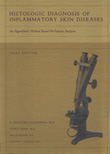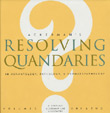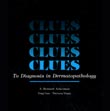おすすめ書籍のご案内
木村鉄宣が監修・執筆した本、診断の参考としている教書をご紹介いたします。
画像をクリックするとアマゾン購入画面へ移動します。
| 皮膚病理テキストの決定版 皮膚科サブスペシャリティ 1冊でわかる皮膚病理 |
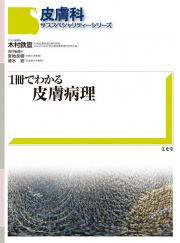 |
「皮膚病理は苦手」という医師が楽しく学べる工夫が満載。豊富な写真とポイントを押さえた解説で、臨床像と病理を結びつけた理解ができる。 |
|
| 木村鉄宣 監修 皮膚軟部腫瘍アトラス |
 |
最新のWHO分類や知見を反映させた皮膚軟部腫瘍アトラスとなっており、 美麗な組織像と簡潔な解説で読者を軟部組織の世界へ誘う。 軟部腫瘍の診断が苦手な初心者から病理のエキスパートまで、必携のカラーアトラスである。 |
|
| 皮膚科の醍醐味が 伝わってくる 標準皮膚科学 第9版 |
 |
900点を超える図版。各専門領域の第一人者による、その真髄に触れる記載。 毎版進化を続ける皮膚科教科書の決定版である。巻末付録として医師国家試験出題基準対照表、医学教育モデル・コア・カリキュラム対照表を新たに掲載している。 |
|
| これからの時代に 必携のテキスト あたらしい皮膚科学 |
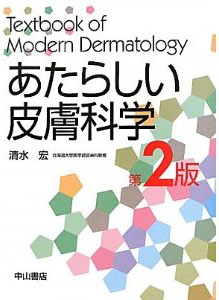 |
皮膚疾患を正しく診断して治療するためにはその疾患の病因・病態を 正確に理解しより多くの症例を診察して経験を重ねることが大切である。 本書で収載された臨床・病理所見は他書を圧倒して優に1,000点を超え、皮膚科医が遭遇するであろうほとんどの疾患を網羅している.従来の考え方によって理解しにくくなっている分類や診断名を、国際的な基準でとらえ直した。 |
|
| 日常の診療で感じる疑問に 皮膚科診療 -こんなときどうするQ&A |
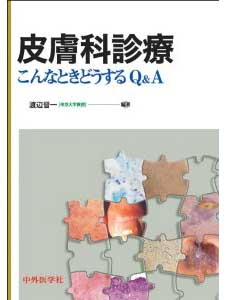 |
皮膚科医が日常感じる疑問や臨床の現場で遭遇しやすい問題点を取り上げ、Q&A形式で解説したハンドブック。 ありふれた疾患にからんだ思いがけない疑問と悩み、誤診例、治療に苦慮する症例に対する対処法など、臨床医が本当に知りたい、実践的な知識をわかりやすく解説した。さまざまな問題に対する第一線の専門家の解答を読み進めていくことで、診療をさらにスキルアップさせることができる。 |
|
| WHAT’S
NEW in皮膚科学 ’08~’09 (2008) |
 |
本書は2年ごとに編者の視点から皮膚科領域における “WHAT'S NEW”を抽出し、専門家にコンパクトな解説をお願いしたものである。各項目は2頁読み切りとし、冒頭に「何が新しい点なのか」を明記したあと、簡潔に最近の進歩の解説を「エッセンス」として記載した。さらに、「なぜこの新知見が臨床的に重要なのか」を最後にまとめ、文献も列挙している。 | |
| 皮膚科診療のコツと落とし穴
(1) |
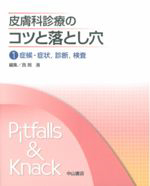 |
誤った診断のもとに治療方針を立てないよう、医師にはその疾患が何であるかを見きわめる技量が常に問われる。本巻では症候・症状、検査、診断に関する話題を取り上げ、鑑別診断の仕方、患者とともに納得できる検査結果の出し方・見せ方など95項目のコツを掲載した。 | |
21
|
最新皮膚科学大系(第11巻)
母斑・母斑症悪性黒色腫 |
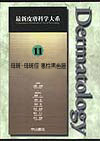 |
母斑および母斑症は近年解明が進み、特に母斑症は原因遺伝子の特定と機能についての分子生物学的研究が進展している。変貌しつつある疾患概念とともに、豊富な臨床写真を用いて各疾患の全貌を詳述する。また、代表的な皮膚悪性腫瘍である悪性黒色腫は、早期の診断と治療により完治可能になってきている。 2002年に改定されたTNM分類の概略とともに、診断と治療について解説する。 |
| 最新皮膚科学大系(第12巻) 上皮性腫瘍 |
 |
患者の生命予後に直接結びつく上皮性腫瘍は、皮膚科診療においてもっとも重要な分野である。病理診断から切除、化学療法など一貫して皮膚科医が行うことの多い日本の現状に対応し、病理組織、治療を総合的に扱った本書は、皮膚科臨床に必携の1冊となっている。 | |
| 最新皮膚科学大系
(特別巻3) |
 |
臨床診断確定に有用でありながら日常診療では「裏付け」的に用いられがちな病理組織所見について、標本の特徴から鑑別診断を進め、最終的に臨床情報と比較・検討して診断するためのポイントを疾患別に解説しています。正常組織の病理像や用語解説も併せて掲載、皮膚科病理組織診断の手引きとして必要不可欠な 1冊である。 | |
| Clinical
Atlas of 101 Common Skin Diseases |
This
atlas is unique among all atlases of dermatology by virtue of the
extraordinary quality of its more than 2,500 color photographs,
and the method by which the subject is taught. |
||
| Histologic
Diagnosis Of Inflammatory Skin Diseases: An Algorithmic Method Based
On Pattern Analysis, 3rd edition |
The work is composed of 11 chapters, 9 of which are housed in the printed volume. Chapters 10 and 11, namely, Inflammatory Diseases and Simulators of Inflammatory Diseases, are ensconced exclusively on Derm101.com, but the nine chapters that constitute the book also are available online. The book provides a user with a series of web links that serve as bridges between the print and the electronic product. | ||
| Resolving
Quandaries in Dermatology, Pathology, and Dermatopathology |
The
second volume addresses, in similar fashion, another 100 conundra,
among them allergic granulomatosis of Churg and Strauss, Wegener’s
granulomatosis, basaloid follicular hamartoma, folliculocentric
basaloid proliferation, and melanoma without competence for metastasis.
|
||
| Differential
Diagnosis in Dermatopathology 1 & 2 & 3 |
Distinctions
between the contrasting pairs of diseases are presented in capsule
and table form by emphatic telegraphic statements. Photomicrographs in color of contrasted diseases that differentiate impressively the histopathologic features are presented at scanning, intermediate, and high magnification. Clinical photographs in color permit a reader to visualize the condition in the gross, an advantage that is particularly beneficial to a pathologist. |
||
| Clues to Diagnosis in Dermatopathology | The three volumes that constitute this trilogy of Clues to Diagnosis in Dermato-pathology are exemplars of sherlockian dermatopathology in which a reader is invited, in the manner of that master of deduction, the physician/logician, Arthur Conan Doyle, to take note carefully of clues (in this instance, certain histopathologic findings) for the purpose of apprehending a culprit (in this case, coming to a diagnosis with specificity). |
||

